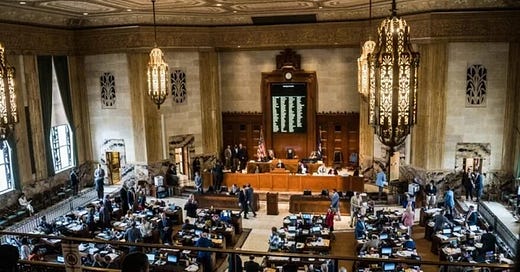Senate Committee Rejects Governor Landry’s Push for Licensing Board Power Grab
By The Bayou Insider Staff
In a rare moment of legislative pushback, a Louisiana Senate committee has blocked Governor Jeff Landry’s latest effort to expand executive power—this time over professional licensing boards that regulate everything from nurses and dentists to physical therapists and counselors. House Bill 603 (HB 603), which would have given the governor unilateral appointment authority over 32 of these boards, was voted down 4–3 by the Senate and Governmental Affairs Committee.
Though narrowly defeated, the proposal sparked a broad and growing conversation about balance of power in Louisiana’s government and the future of independent oversight in key professions.
🔎 What HB 603 Was Trying to Change
Under current law, Louisiana’s licensing boards are partially shielded from political influence. Professional associations submit lists of qualified candidates, and the governor selects board members from those lists. HB 603, authored by Rep. Dixon McMakin (R-Baton Rouge), would have removed that process entirely, allowing the governor to appoint whoever he chooses, regardless of industry vetting or nomination.
The Landry administration positioned the bill as a push for greater transparency and accountability. Supporters said it would prevent professional organizations from controlling the very boards tasked with regulating them—calling it a step toward reducing “insider politics” and increasing responsiveness to public needs.
Critics, however, viewed the bill as a deliberate attempt to dismantle professional self-governance and consolidate political power.
🧠 Why These Boards Matter
Professional licensing boards are not just bureaucratic footnotes. They set standards for education, certification, ethics, and discipline for thousands of practitioners in Louisiana. These boards decide who gets to practice, how complaints are handled, and what rules govern professional behavior.
From the Louisiana State Board of Nursing to the Board of Dentistry and beyond, these entities directly impact public health, safety, and welfare. The professionals on these boards are typically chosen for their subject-matter expertise and years of field experience—not for political loyalty.
Shifting control of appointments to the governor alone would fundamentally change the nature of these boards—and potentially the professions they regulate.
🗳️ The Senate Pushback
HB 603 had already passed the Louisiana House with a strong 75–17 vote, largely along party lines. But in the Senate Governmental Affairs Committee, concerns bubbled up quickly.
Committee members expressed hesitation about giving any governor sweeping control over such a wide range of specialized professions. Several senators worried the bill could weaken standards or lead to politically motivated appointments that compromise board independence.
The 4–3 vote against the bill revealed an important fault line—not just between Democrats and Republicans, but between those who prioritize executive efficiency and those who believe professional regulation should remain insulated from political pressure.
Notably, the defeat came from a bipartisan mix of lawmakers, signaling that concerns over centralized power may be growing—even among those typically aligned with Governor Landry.
🧩 A Pattern of Executive Consolidation
HB 603 isn’t a one-off. It’s part of a broader strategy by the Landry administration to increase gubernatorial control over Louisiana’s sprawling bureaucracy. Since taking office, Landry has supported or signed multiple bills that give the executive branch more influence over regulatory, ethics, and environmental agencies.
In 2024, for instance, laws were passed allowing the governor to directly appoint the chairs of over 150 boards and commissions. Appointments to bodies like the Louisiana Coastal Protection and Restoration Authority and the Board of Ethics were similarly shifted into the governor’s hands.
These moves have led critics to accuse the administration of attempting to create a “governor-first” model of government, in which traditional checks and balances are steadily eroded.
📣 Industry Concerns & Public Sentiment
While most professional groups have not publicly issued new statements following the Senate vote, many previously testified or lobbied in opposition. Their message has been consistent: professional self-regulation, while not perfect, ensures that technical knowledge, not politics, drives the rules.
Consumer groups and patient advocates have also voiced concerns. In fields like medicine, dentistry, and mental health, weakening professional standards can have real-world consequences for vulnerable populations.
At the same time, some citizens—especially those critical of entrenched institutions—support the idea of “draining the swamp,” believing that entrenched boards may protect bad actors or block innovation.
This tension between oversight and autonomy lies at the heart of the HB 603 debate.
🔮 What Happens Now?
Rep. McMakin has already indicated that the fight isn’t over. He told reporters he is exploring alternative pathways for HB 603 or similar language to be folded into other legislation before the current session ends on June 12.
Legislative sessions often see defeated bills resurrected through amendments or last-minute negotiations. Advocates for professional autonomy are watching closely to ensure this bill doesn’t reappear quietly.
Governor Landry’s office, while silent since the committee defeat, has remained vocal in the past about the need to overhaul what it calls an “unaccountable bureaucracy.”
The coming weeks could determine whether HB 603 remains a symbolic setback—or becomes a catalyst for a larger power struggle in Baton Rouge.
🧭 Final Reflections
What’s at stake isn’t just who gets to sit on a board. It’s about how much power any one branch of government—especially the executive—should wield in shaping the rules that govern professions, businesses, and public services in Louisiana.
This bill’s failure represents more than a policy disagreement; it’s a reminder that balance matters. When one part of government grows too powerful, it’s the people—consumers, patients, professionals—who risk being left without a voice.
🔗 Sources:
📢 Call to Action:
Concerned about concentrated power in state government? Now’s the time to act. Contact your state senator and representative. Ask how they voted on HB 603 and where they stand on future attempts to reshape Louisiana’s licensing and regulatory boards.
Stay informed, stay vocal, and help keep Baton Rouge accountable.





